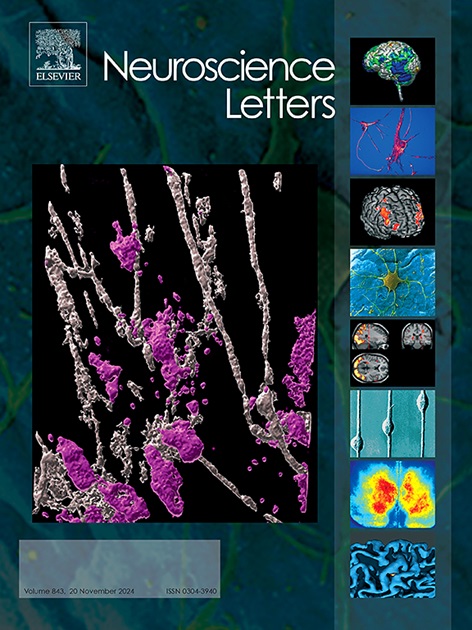烟酰胺腺嘌呤二核苷酸减轻创伤性脑损伤大鼠神经炎症。
IF 2
4区 医学
Q3 NEUROSCIENCES
引用次数: 0
摘要
目的:研究大鼠创伤性脑损伤(TBI)后6 h内的病理生理过程,阐明烟酰胺腺嘌呤二核苷酸(Nicotinamide Adenine Dinucleotide, NAD)在TBI早期的神经保护作用及其机制,探讨NAD直接应用于TBI后局部损伤的可行性及临床益处。材料与方法:将54只6-8 周龄雄性SD大鼠随机分为假手术(SO)加生理盐水治疗组(SO + saline)、脑外伤加生理盐水治疗组(TBI + saline)和脑外伤加10 μM NAD治疗组(TBI + NAD)。在手术后1、3和6 h收集全脑组织。测量TBI生物标志物水平,包括S100β、TNF-α、occludin、PPARβ/δ。结果:大鼠脑外伤后出现明显的神经炎症反应,炎症反应在损伤后3 h达到高峰。S100β、TNF-α、PPARβ/δ和闭塞性也有显著变化。NAD治疗可显著缓解TBI后1 h的神经炎症。结论:TBI可引起大鼠脑内严重的神经炎症,损伤后炎症反应在3 h时达到高峰。NAD治疗可减轻TBI大鼠的神经炎症。本文章由计算机程序翻译,如有差异,请以英文原文为准。
Nicotinamide adenine dinucleotide alleviates neuroinflammation in rats with traumatic brain injury
Objective
To characterize the pathology and pathophysiological processes within 6 h after Traumatic brain injury (TBI) in rats, elucidate the neuroprotective effects and the underlying mechanisms of Nicotinamide Adenine Dinucleotide (NAD) in the early stage of TBI to explore the feasibility and clinical benefits of applying NAD directly to the localized injury after TBI.
Material and Methods
54 male Sprague-Dawley (SD) rats aged 6–8 weeks were randomly assigned equally to three groups, sham-operated surgery (SO) with saline treatment (SO + Saline), TBI with saline treatment (TBI + Saline), and TBI with 10 μM NAD treatment (TBI + NAD). The whole brain tissues were collected at 1, 3, and 6 h following the procedure. Levels of biomarkers for TBI including S100β, TNF-α, occludin, PPARβ/δ were measured.
Results
Significant neuroinflammation was observed in the rat brains after TBI, which peaked at 3 h following injury. Significant changes in S100β, TNF-α, PPARβ/δ, and occluding were also observed. Treatment with NAD significantly alleviated neuroinflammation at 1 h following TBI.
Conclusions
TBI caused severe neuroinflammation in rat brains, which peaked at 3 h following injury. Treatment with NAD alleviated neuroinflammation in TBI rats.
求助全文
通过发布文献求助,成功后即可免费获取论文全文。
去求助
来源期刊

Neuroscience Letters
医学-神经科学
CiteScore
5.20
自引率
0.00%
发文量
408
审稿时长
50 days
期刊介绍:
Neuroscience Letters is devoted to the rapid publication of short, high-quality papers of interest to the broad community of neuroscientists. Only papers which will make a significant addition to the literature in the field will be published. Papers in all areas of neuroscience - molecular, cellular, developmental, systems, behavioral and cognitive, as well as computational - will be considered for publication. Submission of laboratory investigations that shed light on disease mechanisms is encouraged. Special Issues, edited by Guest Editors to cover new and rapidly-moving areas, will include invited mini-reviews. Occasional mini-reviews in especially timely areas will be considered for publication, without invitation, outside of Special Issues; these un-solicited mini-reviews can be submitted without invitation but must be of very high quality. Clinical studies will also be published if they provide new information about organization or actions of the nervous system, or provide new insights into the neurobiology of disease. NSL does not publish case reports.
 求助内容:
求助内容: 应助结果提醒方式:
应助结果提醒方式:


